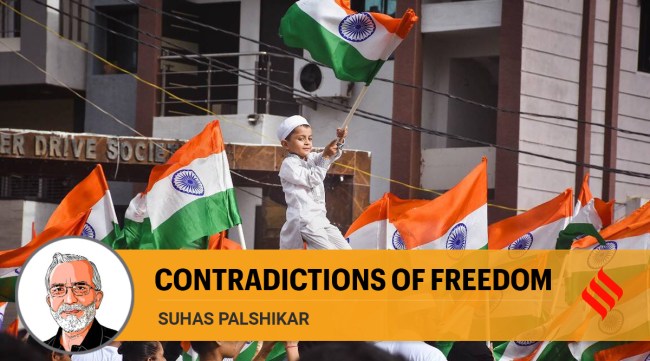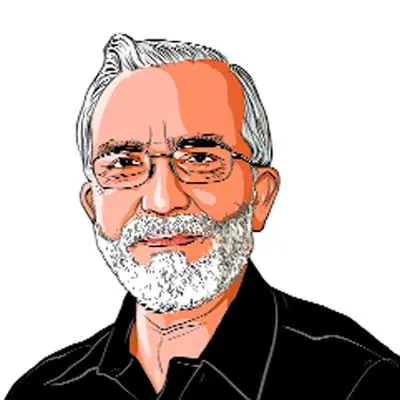Opinion India@75: As we celebrate the nation, we must also reflect on the mixed nature of our democracy
Suhas Palshikar writes: The individual as a political unit finds herself, and her rights, dwarfed by an expanding state and faltering institutions.
 A young boy holds the tricolor during a 'Har Ghar Tiranga' march, ahead of Independence Day, in Surat on Friday, (PTI Photo)
A young boy holds the tricolor during a 'Har Ghar Tiranga' march, ahead of Independence Day, in Surat on Friday, (PTI Photo) Celebrations around August 15 are mainly about freedom. This year is even more special as it marks 75 years of Independence and, as such, deserves a more nuanced commemoration. While freedom from foreign rule is a cherished gift we acquired 75 years ago, we must remember that the celebrations on August 15 are and should be as much about democracy as about our national self-respect and identity. India’s freedom was not merely an assertion of nationhood. Implicit in that nationhood was also an idea about how to conduct the affairs of the nation. While our ability to sustain independence gives us pride and satisfaction, our ability to consolidate democracy should be a matter of deep concern and introspection. As we pause to review the life of India’s democracy, we witness many a contradictory feature. In fact, it may not be an exaggeration to say that our democracy is marked by contradictoriness.
This contradictoriness emanates from the celebrations themselves. The celebrations are about the nation. They are also about the abstract idea of the people. Yet, we are on the path of limiting both the scope of the nation and the expanse of what constitutes the people. The present juncture is marked by attempts to shrink the nation to one community. This tends to result in exclusion rather than inclusion. The nation envisioned 75 years ago was certainly not confined to any one community but today, the entire nationalist rhetoric is marked by exclusion and an overemphasis on community identity. The famous phrase “we the people” will continue to be invoked but it will refer to only a select section as the people. Apart from privileging one community over others, the idea of the people is also beset with the exclusion of the physical peripheries of the nation. Besides, a new hierarchy between the nation and democracy is emerging. In this hierarchy, democracy is secondary to the nation. This also undermines the importance of the idea of the people because once democracy is sidelined, people exist only as constituents of the nation rather than as having agency.
The second contradiction is about the foundational document. India takes pride in a Constitution, which is both a stabilising and revolutionary document. There are celebrations of that document but the adoption of its spirit in social and political practice is half-hearted. More worryingly, the stabilising dimension of the Constitution is used to make the state all-pervasive and transform governance into full-time, all-round regulation of the idea of citizenship. This is reflected in the governance practices of the present regime but it also predates it. The two most revolutionary elements of the Constitution — fundamental rights and directive principles — are conveniently set aside from time to time in favour of setting up a state that is more a menace to citizens than their friend and benefactor. Our legislative choices, executive practices and judicial interpretations have undermined the Constitution from time to time. The ornamental status of the Constitution fails to serve its true purpose — imposing strict limits on those who hold power — and draws attention away from the task of rebuilding society. In fact, the objective of rebuilding society is denied primacy. From the extant document, a new Constitution is thus extracted as an instrument of regulation and control rather than freedom and well-being.
Third, democracy depends on a web of institutions. India cannot complain about the paucity of institutions — we have institutions aplenty. The Constitution gave us many institutions and subsequently, Parliament has added to them regularly. Ironically, a majority of the new institutions we create tend to serve the purpose of controlling citizens. The enabling role of institutions is lost. In any case, our true contribution is not in creating institutions but rather in their talented mishandling — transforming them into instruments of oppression at worst and repositories of power and privilege at best. Today, even as we witness a serious erosion of most institutions, we must also admit that even in the past there has been a failure to ensure autonomy and efficiency of institutions of governance. This is partly because of the common understanding that “politics” means interference in institutional functioning. Our public life generally manifests a robust disrespect toward institutions to the degree that politics often resembles shades of populism. In the name of people and people-power, norms and institutions are sacrificed. This is often seen, both by the public at large and by the political power holders, as a legitimate expression of popular sovereignty.
Four, while adult suffrage brought about political equality in one stroke, our politics is marked by deep inequalities. The threshold for being able to “do politics” is so high that ordinary citizens find it difficult to engage with public life. One sure way of entering the public arena is the family route. Unless there is a family connection, entry into politics is tough. And once someone enters politics, that person immediately becomes a distinct species. The political class has constituted itself into a special category and while it invokes the idea of people fairly regularly, its practices manifest a chasm between the people and the politician. Even at the most local level, a politician holds prestige, power and resources compared to “ordinary” men and women. Needless to say, this political inequality is exacerbated by and in turn, enhances various other inequalities. Is it not contradictory that while we celebrate being the largest democracy, we are also a substantively and politically unequal society?
Finally, what about the basic unit — the individual — that contributes to the formation of the category called the people? Democracy hinges on the balance between the people as a collective and the individual. But in India’s democratic life, the idea of the individual seldom carries weight. Within communities, individuals are secondary; individual freedoms such as freedom of expression are seen both by the public and rulers as unnecessary; the fundamental principle of the right to life and liberty is ignored in practice and in jurisprudence pertaining to arrests and bail and even the primary idea of the burden of proof is easily ignored in the name of the almighty state. Between the state and the individual, the state is imagined as the higher altar of power, virtue and wisdom.
The anniversary of our freedom is an occasion to remind ourselves of these contradictions and to realise that democracy in India operates within them. This pathology of contradictoriness makes our democracy both weak and vulnerable. These are certainly not contradictions that have arisen today. The present generation has inherited them from those present early in the post-independence moment. However, what makes these contradictions jarring at the present juncture is the relationship between them and the present regime. This regime is a product of these contradictions and, in turn, it exploits them in order to draw sustenance for itself. This portends an aggravation of the contradictions. The best way to celebrate 75 years of our nationhood is to remind ourselves of the contradictoriness of democracy that we practice.
The writer, based in Pune, taught political science and is chief editor of Studies in Indian Politics





